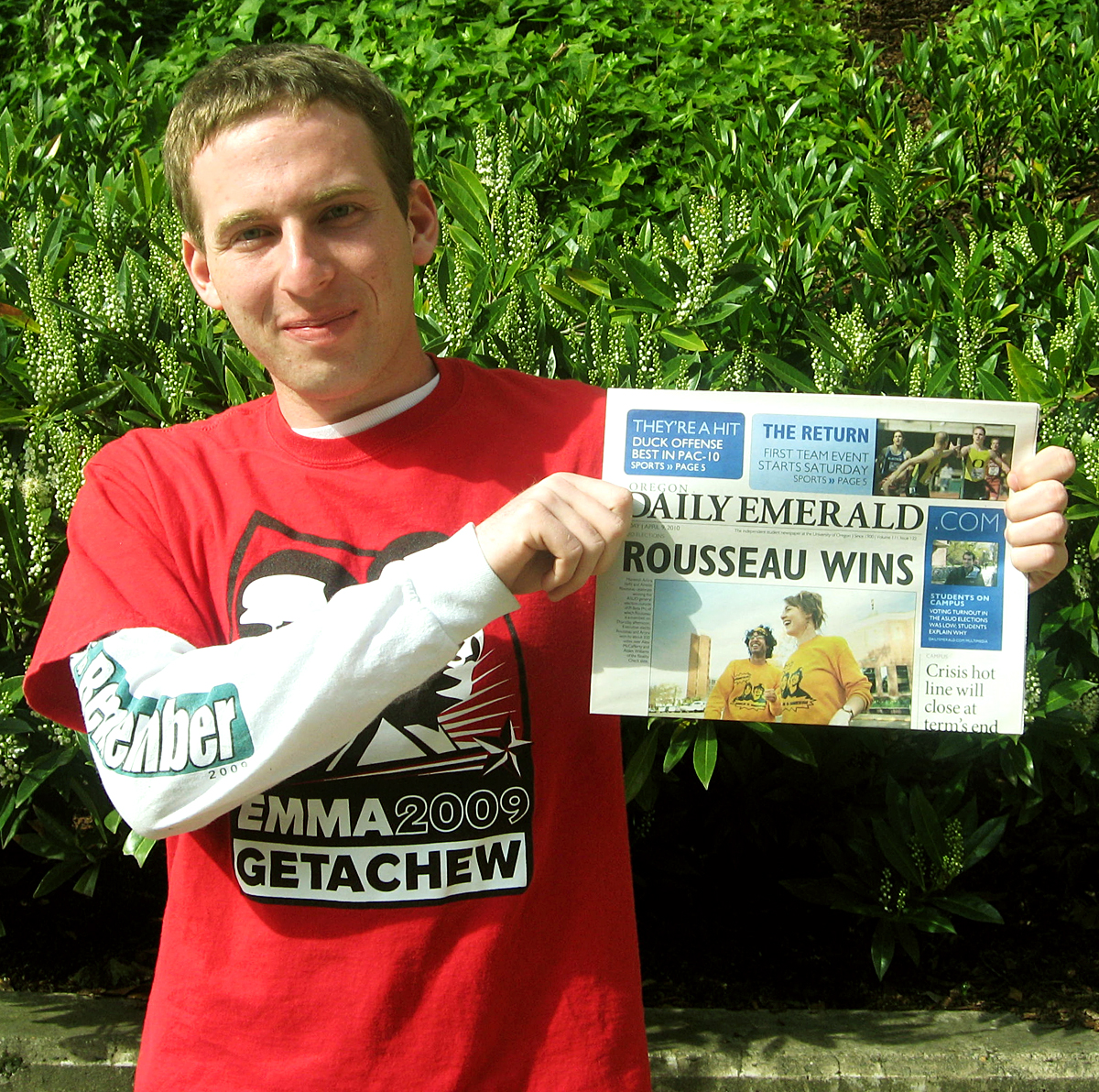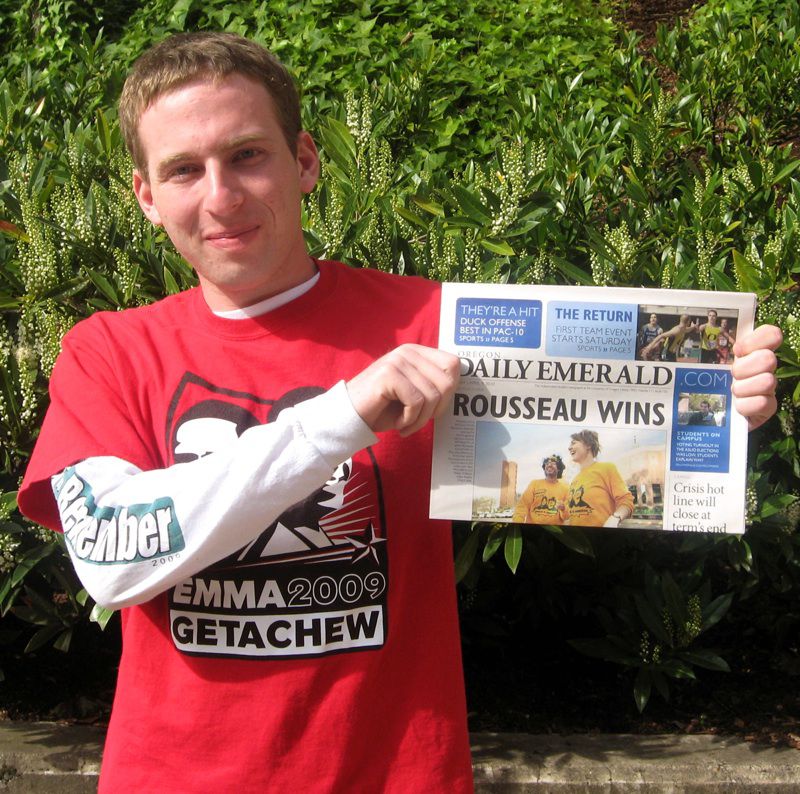Interview and Photos by Leah Kennedy
“This is better than when Obama won!” These were some of the first words out of campaign manager Ben Eckstein’s mouth upon first seeing his presidential candidate, Amélie Rousseau, after their win on Thursday, April 8. Eckstein sat down with Ethos to explain the importance of a campaign manager in an ASUO election.
Leah Kennedy: How did you get your position?
Ben Eckstein: Amélie told me shortly after she knew she was going to run, she kind of let me into the loop. We worked together on Emma [Kallaway] and Getachew [Kassa]’s 2009 campaign so we had been good friends and we were colleagues from the ASUO, so she told me that she was considering running and I told her she had my full support and that I wanted to be on board with it. Eventually that turned into a management position.
LK: What were your initial feelings at the start of the campaign?
BE: It was pretty overwhelming. We were really excited. We were really invested in the idea of Amélie being president, but also we had a pretty new team. We’re all kind of new so there was definitely some times it was overwhelming and a sense of like what are we doing, but we fluctuated between extreme excitement and extreme anxiety.
LK: What have been your main duties over the past two weeks?
BE: It’s really scattered. We have a team so things have really gone back and forth. We all kind of chipped in with strategy. I was really managing volunteers, checking in, making sure communication was working, but the volunteer coordination was really huge for me.
LK: How large a role does a campaign manager play in an ASUO election?
BE: In my experience, a pretty big role. When I worked on Emma and Getachew’s campaign, when the campaign ended there was just this huge sense of what their campaign managers had done and this year I got a totally new perspective because [Emma and Getachew campaign managers] Ella Barrett and Allison Fox made it look really easy. We saw how it was not easy at all and how they always looked like they knew what they were doing, and this was an experience where you never knew really if what you were doing was right or how you were supposed to be doing it. The simply answer is I think the campaign managers play a pretty big role in that I think there’s kind of just a team with the candidates and managers. I mean me, [fellow campaign members] Maneesh Arora, Sinjin Carey, and Amélie, we were all in it together.
LK: What were your feelings after the primary results were announced? After the final results?
BE: We felt incredibly excited to have made it and we also felt like we had all along, which is that we are the underdogs and we still have a lot of work to go so it was kind of a really good mix between excitement and urgency at the same time. When we won, I couldn’t even control myself. It felt like, I can’t even describe it. It was the culmination of everything. It was like everything we wanted had just happened and everything we worked toward, we actually did it. It was just a sense of accomplishment.
LK: Did the primary results change your strategy for the general election? If not, why not?
BE: I don’t think so. We knew that we would be running against really one of three other candidates and we also knew that we shared a lot of values with the Campus Change Coalition, so we didn’t have to do a complete about face when we were running against Reality Check because we did have some policy differences that spoke for themselves.
LK: Do you have any future plans with this administration? If so, what are they?
BE: I have no doubt that Sinjin and I and a lot of the volunteers and a lot of the other managers will all be involved in some way next year. I can’t imagine that any of us wouldn’t be. Right now we’re just supporting Amélie and Maneesh with transitions, celebrating, and focusing on the Spring Voter Registration Drive, which is the next thing coming up.
LK: How do you candidates plan to follow through with their campaign promises in the short term? Long term?
BE: The immediate thing is that they need to get together a new executive staff, have a really smooth transition and coordinate with Emma and Getachew and their administration. They also need to build relationships with all the people who were elected to any positions because there’s a diverse spectrum of opinions and perspectives and experiences so everyone needs to get on the same page. In the long term, carrying out a planning process, remembering where we came from and being true to what we represented in the campaign and also being open to compromise and flexibility and working with all the great candidates that made it through.
LK: How will you address the OSPIRG issue? What influence will the close margin of voting have on your campaign’s stance on the issue?
BE: I think Amélie and Maneesh recognize it’s a really complex issue. There is no black and white. I know that the key to this is really collaboration and I know that Amélie and Maneesh strongly believe that no matter what happens with OSPIRG it is going to have to be a collaborative process.
LK: If you could tell the U.O. student body one thing about the backstage scene of an ASUO election, what would it be?
BE: The volunteers on all campaigns are incredible people who really want to be involved. We understand that elections are annoying. We don’t kid ourselves about that. We know it annoys people, but that we also think its really worth it and that I think for all the campaigns, our hearts are in the right place. We want to have an opportunity to have our voices heard and be involved. That’s really what all the annoying clip-boarding and phone-banking is about.
See Ethos’ Q&As with 2010 ASUO President-elect Amélie Rousseau and her opponent Alex McCafferty.









